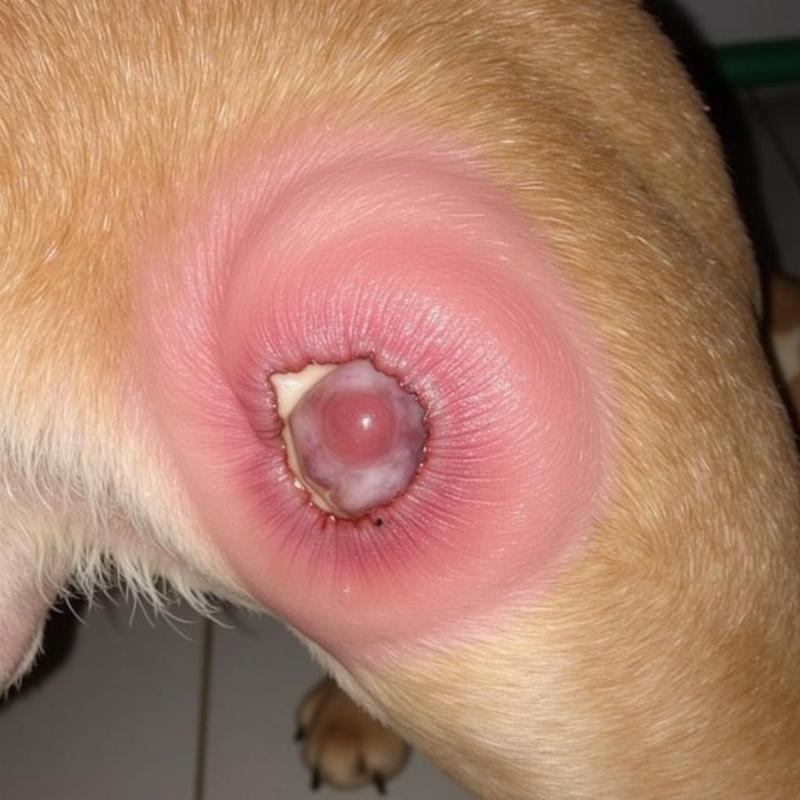Bed sores, also known as pressure sores or decubitus ulcers, are a serious concern for dogs, especially those with limited mobility. These painful wounds develop due to prolonged pressure on certain areas of the body, restricting blood flow to the skin and underlying tissues. Understanding how to identify, treat, and prevent bed sores is crucial for maintaining your dog’s comfort and overall health.
Recognizing the Signs of Bed Sores in Dogs
Early detection of bed sores is vital for effective treatment. Look for reddened or discolored skin, particularly around bony prominences like elbows, hips, and hocks. The affected area might feel warmer or cooler than the surrounding skin. As the sore progresses, you may notice hair loss, open wounds, or even a foul odor. If you suspect your dog has a bed sore, consult your veterinarian immediately.
 Chó bị lở loét
Chó bị lở loét
Treating Bed Sores: Veterinary Care and Home Management
Treating bed sores requires a multi-pronged approach involving veterinary care and diligent home management. Your veterinarian will assess the severity of the sore and recommend appropriate treatment, which may include:
- Wound Cleaning: Cleaning the wound with a gentle antiseptic solution, as prescribed by your vet, is essential to prevent infection.
- Medications: Antibiotics or pain relievers may be necessary to manage infection and discomfort.
- Bandaging: Bandaging the wound can protect it from further trauma and promote healing.
- Surgery: In severe cases, surgical debridement (removal of dead tissue) may be required.
At home, you can support your dog’s recovery by:
- Providing Soft Bedding: Ensure your dog has a comfortable, supportive bed that relieves pressure on bony prominences. Consider specialized orthopedic beds or memory foam mattresses.
- Frequent Repositioning: If your dog is immobile, reposition them every 2-3 hours to distribute pressure evenly.
- Nutritional Support: A balanced diet rich in protein and essential nutrients is crucial for wound healing. Your vet may recommend supplements to support skin health.
Preventing Bed Sores: Proactive Measures for Your Dog’s Well-being
Prevention is always better than cure when it comes to bed sores. Here are some proactive measures you can take:
- Regular Grooming: Keeping your dog’s coat clean and dry can prevent skin irritation and infection.
- Maintaining a Healthy Weight: Obesity increases pressure on joints and can contribute to bed sore development.
- Providing Regular Exercise: Regular exercise, appropriate for your dog’s age and condition, improves circulation and muscle tone, reducing the risk of pressure sores. waterproof shock collars for dogs may help during exercise with some breeds.
- Protective Padding: Use padding, such as soft blankets or cushions, to protect bony prominences, especially during car rides or when your dog is resting on hard surfaces.
- Skin Inspections: Regularly inspect your dog’s skin, especially around bony areas, for any signs of redness, discoloration, or irritation.
Conclusion
Bed sores are a serious but preventable condition. By being vigilant and proactive, you can ensure your dog’s comfort and well-being. Regular skin inspections, providing supportive bedding, frequent repositioning, and maintaining a healthy lifestyle can significantly reduce the risk of bed sores. If you notice any signs of bed sores, consult your veterinarian immediately for prompt diagnosis and treatment. Remember, early intervention is key to a successful recovery.
FAQ
- What are the first signs of a bed sore on a dog? Reddened or discolored skin, especially over bony areas, is often the first sign.
- How can I prevent my dog from getting bed sores? Provide soft bedding, reposition your dog frequently, maintain a healthy weight, and perform regular skin inspections.
- Can bed sores be treated at home? While some home care can support healing, veterinary guidance is crucial for proper treatment and management of bed sores.
- Are certain breeds more prone to bed sores? Large or giant breeds, senior dogs, and those with mobility issues are at higher risk.
- How long does it take for a bed sore to heal? Healing time varies depending on the severity of the sore and the dog’s overall health.
Beautdogs.us: Your Trusted Source for Dog Care
Beautdogs.us is your premier online destination for comprehensive and engaging information on dog care, breed-specific advice, and product recommendations. We offer expert guidance on everything from nutrition and grooming to training and health management, catering to both new and experienced dog owners. Learn more about our products and services, including insights on topics like atropine eye drops for dogs, apple cider vinegar for mange in dogs, and when to put down a dog with ivdd. As a trusted resource for all things dog-related, Beautdogs.us provides authoritative yet accessible content to help you navigate the joys and challenges of dog ownership. Contact us today at [email protected] or +1 501-555-7529.